New Sarajevo Archbishop Warns of Continued Emigration From Bosnia
ZAGREB, 12 Feb 2022 - As people are continuing to emigrate from Bosnia and Herzegovina, including Catholic Croats, the country's authorities are showing no interest in addressing this problem, the new Roman Catholic Archbishop of Sarajevo, Tomo Vukšić, warned on Saturday.
Speaking in an interview with Fena news agency, Vukšić cited data from the parishes according to which 424,000 Catholics had lived in Bosnia and Herzegovina immediately after the country's 1992-1995 war, and the country was left without as many as 100,000 Catholics in the 2003-2019 period alone.
Before the start of the coronavirus pandemic in early March 2020, slightly over 350,000 Catholics had lived in Bosnia and Herzegovina, and their emigration continues, the archbishop noted.
He said people were leaving because they could not find work, as well as because of hopelessness, corruption and legal uncertainty.
"This affects people of all faiths, but unfortunately just like in neighbouring countries, the government is hardly interested, which is a shame," Vukšić said.
He said that all problems, including demographics, should be dealt with faster, and that religious communities had the responsibility to establish and promote dialogue as a precondition for addressing the problems.
"Ecumenism and dialogue is achieved through open and friendly meetings with other people who are different. This is an integral and indispensable part of the identity and mission of the Catholic Church, even when perhaps others do not accept it," the archbishop said. "I want such cooperation and dialogue with everyone and will always try my best to be open."
Vukšić succeeded Cardinal Vinko Puljić, who had served as Archbishop of Sarajevo for 30 years until last month when he was retired by Pope Francis.
For more, check out our politics section.
EU Must Send Strong Message to Those Halting Bosnia Election Reform, Croatia FM Says
ZAGREB, 24 Jan 2022 - Croatian Foreign Minister Gordan Grlić Radman said on Monday the EU must send a clear and strong message to those halting the electoral reform process in Bosnia and Herzegovina.
Grlić Radman was in Brussels attending a meeting of EU ministers.
Speaking to the press, he said he had spoken of the situation in BiH and informed his counterparts about efforts to amend the electoral law in which US and EU representatives are involved.
"I informed them about the worrying situation in BiH. I said that it's necessary for the EU to send a strong, clear and unambiguous message to those who are halting electoral law changes and whom the status quo suits."
He reiterated that it's necessary to change the electoral law in order to eliminate all forms of discrimination in the election process and to enable the legitimate representation of the three constituent peoples in state bodies.
Grlić Radman said several of his counterparts had supported his stand and that more political efforts should be invested in BiH so that it did not become an area of interest of third countries.
Milanović Reiterates Idea to Mediate in Bosnia with Vučić and Erdogan
ZAGREB, 4 Nov 2021 - Croatian President Zoran Milanović on Thursday reiterated the idea for representatives of the three constituent peoples in Bosnia and Herzegovina to sit down together with him and the presidents of Serbia and Turkey "because in such a setting a satisfactory solution can be found" to the crisis in that country.
"I would like to see Serbian President Aleksandar Vučić and Turkish President Tayyip Erdogan as some sort of guarantors. There will be misunderstandings, but let's see what can be done for Bosnia and Herzegovina to remain whole," Milanović told the press in Zagreb.
He believes that "only in such a setting can a satisfactory solution be found."
"Each side, and that means the three ethnic sides, would have someone they trust as well as someone they do not fully trust. I'm not sure how much the Bosniaks trust Vučić, but the Serbs do. That is enough for me," Milanović said.
The president recently called Prime Minister Andrej Plenković to coordinate the policy towards BiH, to which Plenković retorted that Milanović was "a staunch advocate of Željko Komišić whom he supported against the HDZ member," and that now he seems to be "mates with Dodik."
Milanović responded by saying that the prime minister needs to explain why he is making statements in Brussels that "are detrimental to the Croats."
"I am saying we need to maintain a common front, not in discipline but in views. Each one of our disputes in Croatia causes bitterness and nausea in Mostar, Široki Brijeg, and Vitez," said Milanović.
During the EU-Western Balkans summit in October, Plenković said the EU was following Dodik's statements about the functioning of Bosnia and Herzegovina "with caution and disapproval".
For more on politics, follow TCN's dedicated page.
PM: Decision Making on Croatia's Schengen Bid Going According to Plan
ZAGREB, 22 Oct (Hina) - Prime Minister Andrej Plenković said in Brussels on Friday he expected the decision making process on Croatia's accession to the Schengen area to proceed according to plan.
"I have discussed this matter at all levels, with all governments. I think the momentum is slowly gathering for a decision at the level of the Council of the EU," Plenković told reporters on arrival for the continuation of the two-day EU summit.
Plenković said that ongoing talks during the Slovenian EU presidency and the next French presidency would be "crucial for achieving Croatia's strategic goal - to become a member of the Schengen area."
Among the topics to be discussed at the summit will be protection of the EU's external borders against illegal migration.
Plenković said that also discussed would be several action plans with non-EU countries, including Bosnia and Herzegovina, to help them improve migration management.
He said that during discussion on foreign policy matters on Thursday evening he had drawn attention to the situation in Bosnia and Herzegovina, notably to the existing tension and statements by the Serb member of the state presidency, Milorad Dodik, which destabilise the country.
"Croatia supports a single Bosnia and Herzegovina, its independence, sovereignty and good functioning. I also made it clear that the EU should help, together with our partners, first of all the United States, to achieve a timely agreement on electoral legislation so that at next year's elections the Croats, as one of the three constituent peoples, can be legitimately and equally represented in the institutions of Bosnia and Herzegovina," Plenković said.
He said he was pleased with the quality of the discussion on this matter, adding that several leaders had taken part in it.
For more on politics, CLICK HERE.
Plenković Requests Turkish President's Support for Bosnia Election Legislation Reform
ZAGREB, 17 June 2021 - Croatian Prime Minister Andrej Plenković met with Turkish President Recep Tayyip Erdogan on Thursday, requesting Turkey's support for efforts to ensure respect for equality of all three constituent peoples in Bosnia and Herzegovina and for an election legislation reform in the country.
Plenković flew to the Turkish city of Antalya to attend a summit of the South-East European Cooperation Process (SEECP), being held under Turkish chairmanship. Turkey assumed the SEECP chairmanship on 1 July 2020. Plenković met Erdogan on the sidelines of the meeting.
"One of the topics was Bosnia and Herzegovina. I underscored that it is very important for Croatia that all three constituent peoples in Bosnia and Herzegovina are equal, notably the Croats who are the least numerous," the Croatian premier said after meeting with the Turkish head of state.
Bosnia and Herzegovina's Croats and the government in Zagreb claim that the Croats are currently not represented on the country's collective presidency and in other institutions because the current member of Bosnia and Herzegovina's tripartite presidency, Željko Komšić, who sits as the Croat representative, is only the nominal representative because he was elected thanks to votes from the Bosniak electorate.
"For us, it is also important that consensus is reached on the election legislation reform during the process of negotiations between political parties and institutions in Bosnia and Herzegovina, and in this regard, I asked for Turkey's support," said Plenković.
"Of course, in the political sense, Turkey has closer relations with the Bosniaks in Bosnia and Herzegovina and finally with the political leadership of the SDA party. Therefore it is essential that we, Turkey and Croatia, in dialogue with friendly institutions and political parties that are close to us, seek solutions that will ensure that all the peoples and citizens of Bosnia and Herzegovina feel satisfied," Plenković said.
Croatia-Turkey relations very good and friendly
Plenković described the Croatian-Turkish bilateral relations as very good and friendly.
There are many Turkish companies doing business in Croatia, and Ankara would like to intensify the business cooperation, according to Plenković.
"Croatia is open and we think that will be very much to our benefit," he added.
Plenković informed Erdogan that Zagreb appreciated Turkey's care for a huge number of refugees and efforts to prevent the reactivation of the western Balkan migrant route.
The Croatian PM believes that the agreement between the EU and Ankara on care for migrants will be honored
For more about politics in Croatia, follow TCN's dedicated page.
Bosnia and Croatia Sign Military Cooperation Plan for 2021
ZAGREB, 26 February, 2021 - Bosnia and Herzegovina and Croatia on Thursday signed a military cooperation plan for 2021, the Bosnian Defence Ministry said.
The document was signed by Bosnian Assistance Defence Minister Zoran Šajinović and Croatia's Military Attaché to Bosnia and Herzegovina, Brigadier Davor Kiralj.
The plan provides for 27 joint activities in Croatia and 14 in Bosnia and Herzegovina. The activities include military education and training, exercises and high-level meetings.
Šajinović and Kiralj expressed their satisfaction with the cooperation between the armed forces and defence ministries of the two countries with a view to further promoting good neighbourly relations between Bosnia and Herzegovina and Croatia.
They expressed confidence that the cooperation would continue to be expanded in a spirit of Euroatlantic integration for the benefit of both countries.
Building Bridges Between Croatia, Bosnia and Serbia
February 18, 2021 – Appropriate government bodies of the three neighbours have come together and agreed to work together to improve bridges between Croatia, Bosnia and Serbia
We say building bridges between Croatia, Bosnia and Herzegovina and Serbia. It's actually more a case of renovating and maintaining bridges between Croatia and the two neighbours to the east.
Despite what journalist Zdenko Jurilj describes as “constant political skirmishes” between the neighbours, in Vecernji List's coverage of this news, the Bosnia and Herzegovina Council of Ministers and the governments of Croatia and Serbia have reached an agreement to work together in the rebuilding, maintenance and review of bridges which connect them. According to the signed agreement, each party will share 50% of the costs without, as it says, "claiming compensation from the other party, unless otherwise agreed between them."
In other words, the cost of renovating bridges between Croatia and Bosnia will be half paid by Bosnia, half paid by Croatia, the cost of renovating bridges between Bosnia and Serbia will be half paid by Serbia, half paid by Bosnia.
According to the agreement between the three governments, equipment needed for the reconstruction and maintenance of the bridges will be exempt from customs duties. Bridge managers shall make a detailed inspection of each of the bridges at least once every five years and independent experts appointed by the bridges' trustees will inspect them each year.
There are 10 bridges between Croatia and Bosnia and Herzegovina which will be jointly maintained. Most of them stretch between the countries across the Sava river, although a few cross over the Una, Maljevac and Korana rivers. A further 11 bridges between Serbia and Bosnia are within the agreement, making a total of 21 bridges to exist within the deal.
Although there are bridges between Croatia and Serbia (including at Ilok and Erdut in Slavonia), within the article published by Vecernji List there is no mention of an agreement to improve bridges between Croatia and Serbia. Following the optimistic and uplifting promise of the headline at the start of this news item, this fact is a rather more unfortunate metaphor on which to end it.
For the latest travel info, bookmark our main travel info article, which is updated daily.
Read the Croatian Travel Update in your language - now available in 24 languages
Croatian Embassy Sarajevo Attacked Again Last Night
January 31, 2021 – The Croatian Embassy in Sarajevo was last night again the target of an aggressive act. The flag of the European Union, which hung above the entrance, was ripped from its mounting and left lying on the ground in the darkened street
The Croatian Embassy Sarajevo was attacked last night. Zagreb-based media Vecernji List learned the news from their sister title in Bosnia and Herzegovina. A wall mounting that jointly held poles carrying both the Croatian flag and the flag of the European Union were the focus of the attack. Someone tried to rip the metal mounting from the wall on the outside of the Croatian Embassy Sarajevo. This is not the first time the Croatian Embassy in the capital of Bosnia and Herzegovina has been targeted.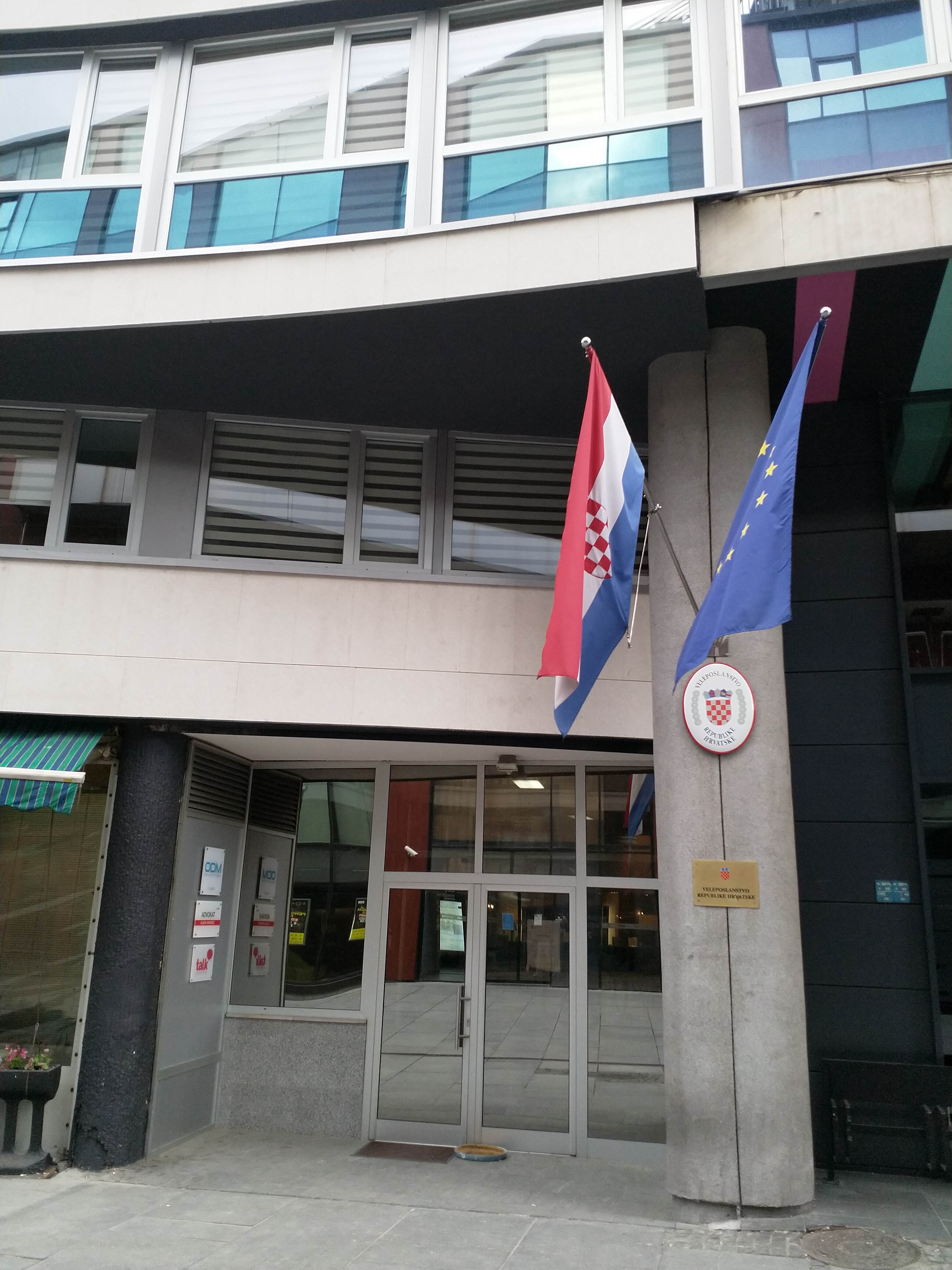 The Croatian Embassy in Sarajevo © Miłosz Pieńkowski
The Croatian Embassy in Sarajevo © Miłosz Pieńkowski
It could have been mindless vandalism, drunken idiocy, politically motivated – or even all three. The Croatian Embassy lies in the very heart of Sarajevo. It is situated just north of the river Miljacka and in the same quarter of the city as the building for the Presidency of Bosnia and Herzegovina, other government and municipal buildings, the Sarajevo National Theatre and is just across the park from the embassies of France and Austria. There are several cafes, bars, fast food restaurants and pubs close by. It is a popularly frequented part of the city at night. Unlike Croatia, businesses selling food, alcohol and other drinks are currently open. Sarajevo city centre is alive at night.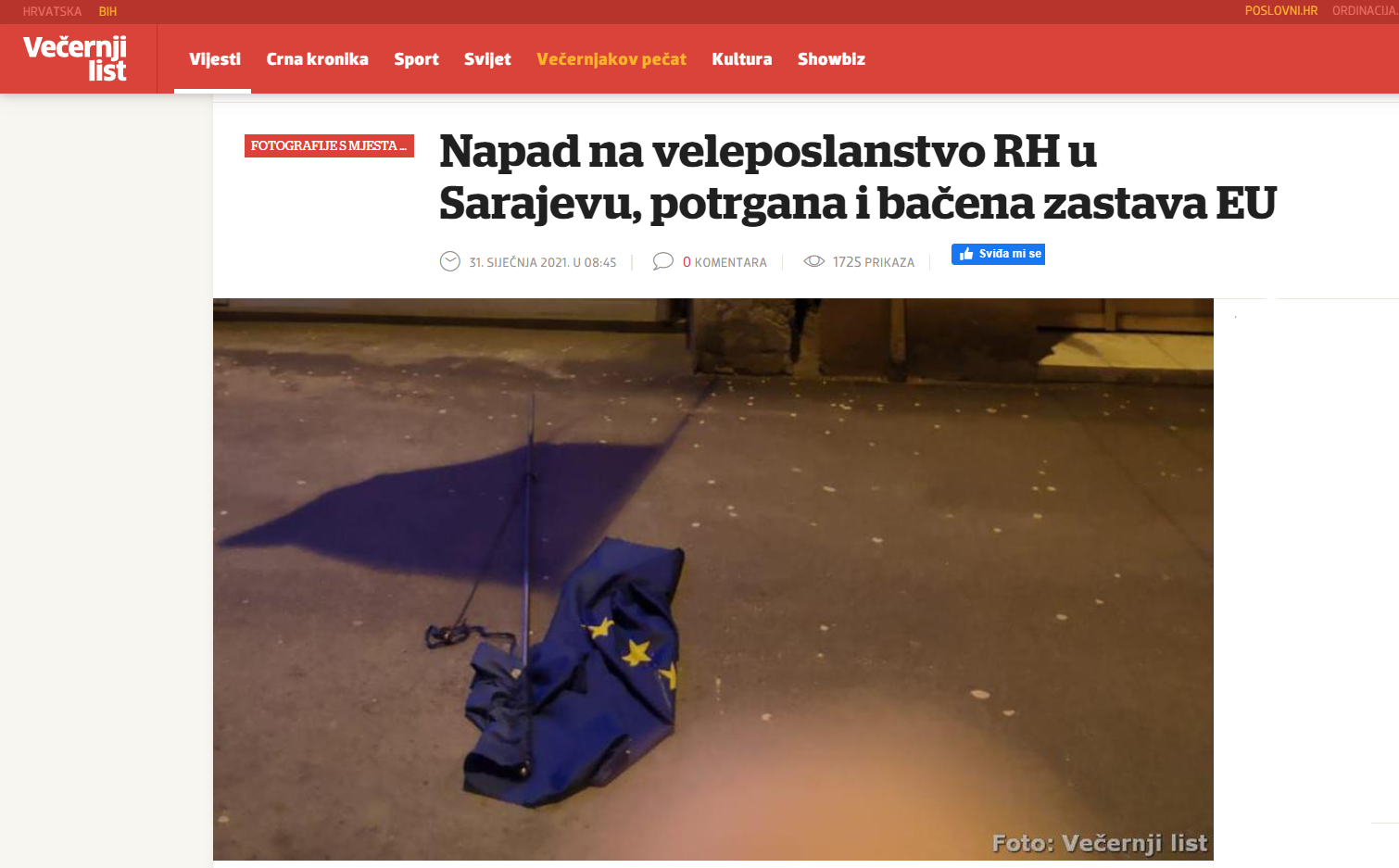
The damage caused to the Croatian Embassy was minimal. The wall mounting was damaged but held firm, as did the pole carrying the Croatian flag. The pole carrying the flag of the European Union fared less well – it snapped under the force of the aggression and was completely prized from the mounting. Last night the pole and the flag of the European Union were left lying on the darkened pavement outside the Croatian Embassy, immediately in front of the doorway above which it previously hung.
An investigation is underway and police are searching for the culprits.
For the latest travel info, bookmark our main travel info article, which is updated daily.
Read the Croatian Travel Update in your language - now available in 24 languages.
Time To Reflect, As Loyalty Not Luxury Saves 2020 Croatia Tourist Season
September 28, 2020 – The tail end of 2020's unparalleled summer offers opportunity for pause, contemplation and appreciation, as it's loyal and not luxury guests that have saved this year's Croatia tourist season.
In this day and age, things always have to get better. There's no room to sit still. Life without improvement is deemed a failure. Nowhere is this more true than the Croatia tourist season.
The numbers of overnight stays in the Croatia tourist season sometimes seem to be the only measure by which its success is judged. Year after year, the numbers must rise. Any decrease is unthinkable. At the same time, hungry eyes still want more. Some want to reposition themselves. A new class of guest is wanted, from faraway nations. They must be of a better quality. They must stay longer, in more expensive dwellings. They must spend more.
Incredible initiatives are undertaken to turn this want into a reality. But, at the end of the 2020 Croatia tourist season, perhaps it's time to pause and reflect. For this year, it is undoubtedly loyalty and not luxury that's saved the Croatia tourist season.
In the year the coronavirus pandemic hit, arrivals by charter plane and cruise ship were seriously curtailed. So much for the flying visits of premium guests from far-flung lands. Instead, the tourists who came were from much closer to Croatia.
The English language that most on the coast are so familiar with was this year useless. On the beaches of Istria and northern Dalmatia, it was Slovenian, Polish, Czech, German, Slovakian and Italian that was heard. The packed bars of Makarska echoed with the familiar call of 'Đe si, bolan?' (where are you, bro? - in Bosnian dialect). Many of those who came drove to Croatia. And many do so every year.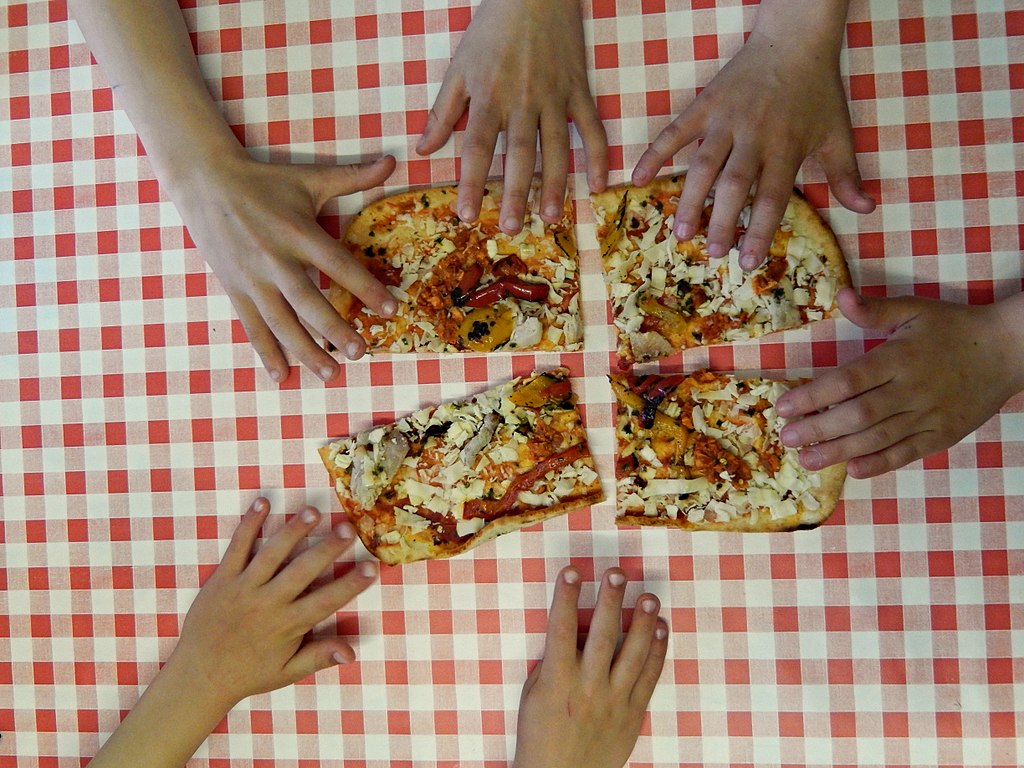 © Jeremy Segrott
© Jeremy Segrott
Sighs and light-hearted jokes about some of these guests persist in some places. “That family come every year, but they only ever order one pizza to share between the four of them.” The choice of footwear of some German-speaking and Czech visitors frequently draws chuckles, in particular, the classic sock and sandal combo. But, just where would the 2020 Croatia tourist season have been without the 60,000 Czech and Slovak visitors who this year arrived by train?
Just two days ago, Jutarnji reported on phenomenal numbers of Polish visitors this year. Would anyone else really have taken the place of the returning family of four sharing a pizza? Just what would the season in Makarska have looked like without bolan?
Croatians are famously very appreciative hosts. On the ground, there's no doubt that such loyal guests are warmly welcomed and thanked each year by accommodation renters, restaurateurs and others. They greet returning visitors with smiles of familiarity and reserve for them their favourite place. In September 2020, gratitude to such guests was echoed by The Croatian National Tourist Board as they launched a new campaign 'Thank you', directed at the tourists who this year chose Croatia.
Perhaps it is time to ensure that this gratitude extends into any grand new initiatives for growth in the Croatia tourist season? Such loyal guests should not be taken for granted, nor forgotten.
Initiative within the Croatia tourist sector is vital. The unlocking of continental Croatia's potential is simply a must. That too of the Dalmatian hinterland and inland Istria. The exploitation of world-class Croatian assets such as nature, agriculture and health and wellness services are also perfectly on-point. The desire to attract a better class of bigger-spending visitor to luxury holidays on the Croatian coast should surely be a lower priority. After all, eyes that covet can all too frequently fail to appreciate that for which they should already be thankful.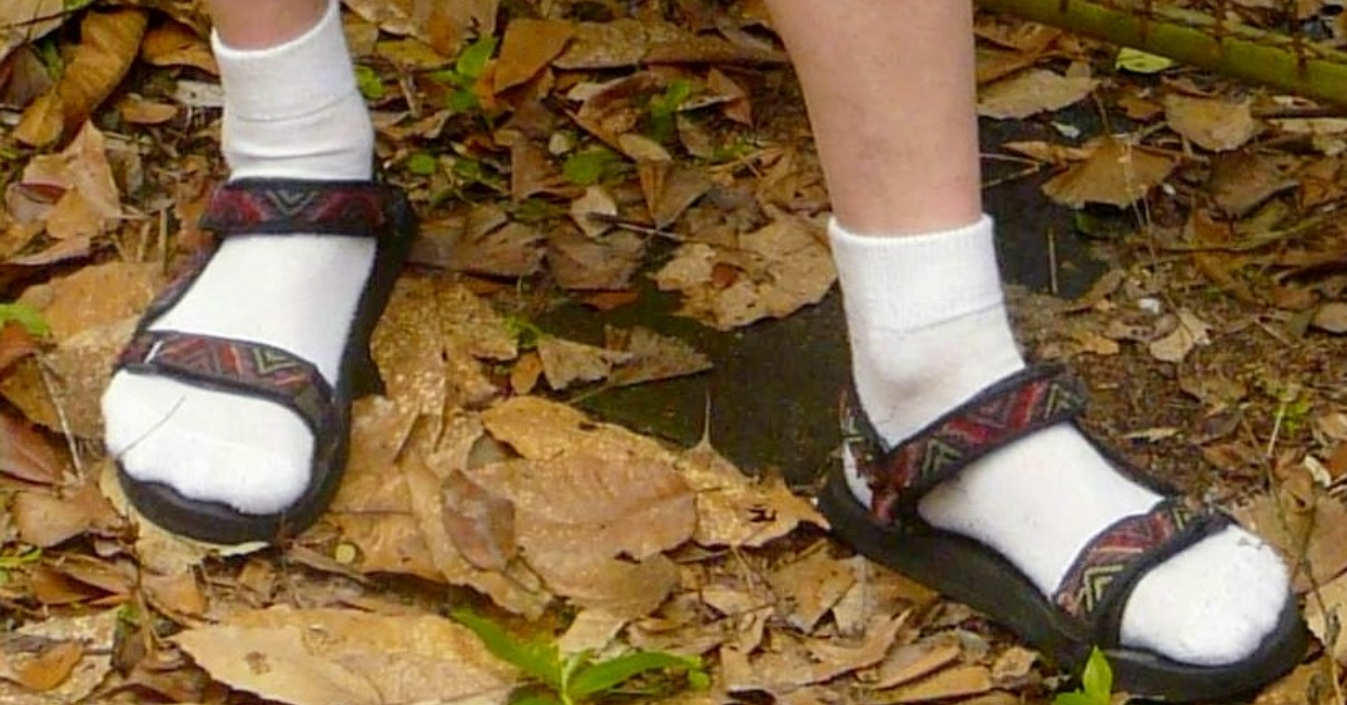 © Oddman47
© Oddman47
Lead image adapted from an original photograph by © Marco Verch
For the latest travel info, bookmark our main travel info article, which is updated daily.
Read the Croatian Travel Update in your language - now available in 24 languages
Hero Croatian Hospital Does Free Dentistry for All Special Needs Children
Wednesday, 9 September 2020 – Angels in white from heroic Croatian hospital Dr. fra Mato Nikolić in Nova Bila offer free dentistry for all special needs children
Few young people look forward to visiting the dentist. But, imagine how such a visit must be if the world is already a confusing and difficult place for you. These are the difficulties of dentistry for all special needs children.
“Children with special needs suffer from a range of disorders,” Dr. Nikola Matković tells TCN over the phone from Croatian hospital Dr fra Mato Nikolić in Nova Bila, near Vitez, central Bosnia. “They can have stunted mental development, autism, Down's syndrome, disharmonic development, epilepsy, cerebral palsy. They all need to put under general anesthetic for dentistry and, of course, that requires a specially trained anesthetist to be present throughout, as well as the surgeon dentist and several members of staff. It can be necessary to have between six and ten highly skilled medical professionals in the operation, depending on the case. And, of course, that's very expensive. The parents of many children simply don't have that kind of money.”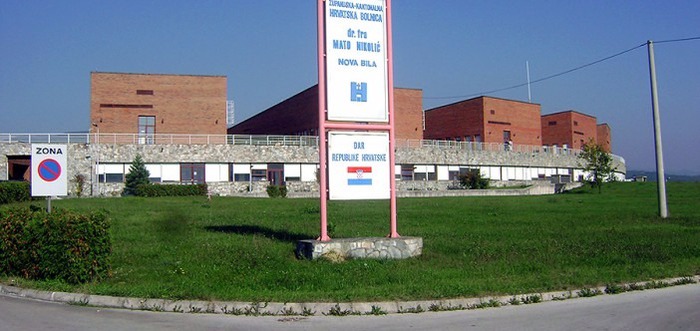
Croatian hospital Dr. fra Mato Nikolić in Nova Bila, which answered the call for free dentistry for all special needs children
A doctor of dentistry, Nikola Matković became acutely aware of the financial difficulties for many such parents in 2016, when NGO Betanija from Vitez put out a call for help. His main job is there, in the local health centre. They help provide care for about 50 special needs clients in the region. Responding to the call, Dr. Matković approached colleagues to see if they'd be interested in trying to help give free dentistry for all special needs children.
Dentist Lidija Lasić-Arapović and anaesthesiologist Zoran Karlović, both from Mostar, were quick to offer their assistance. They were followed by dentists Dr. Anja Hačimić, Dr. Ivana Dunđer-Vidović, Dr. Nikola Kezić, Dr. Ozrenka Raić from central Bosnia and assistants Slavica Šimić and Anita Martinović from Mostar. All agreed to join Dr. Matković in his attempt to offer free dentistry for all special needs children in their region.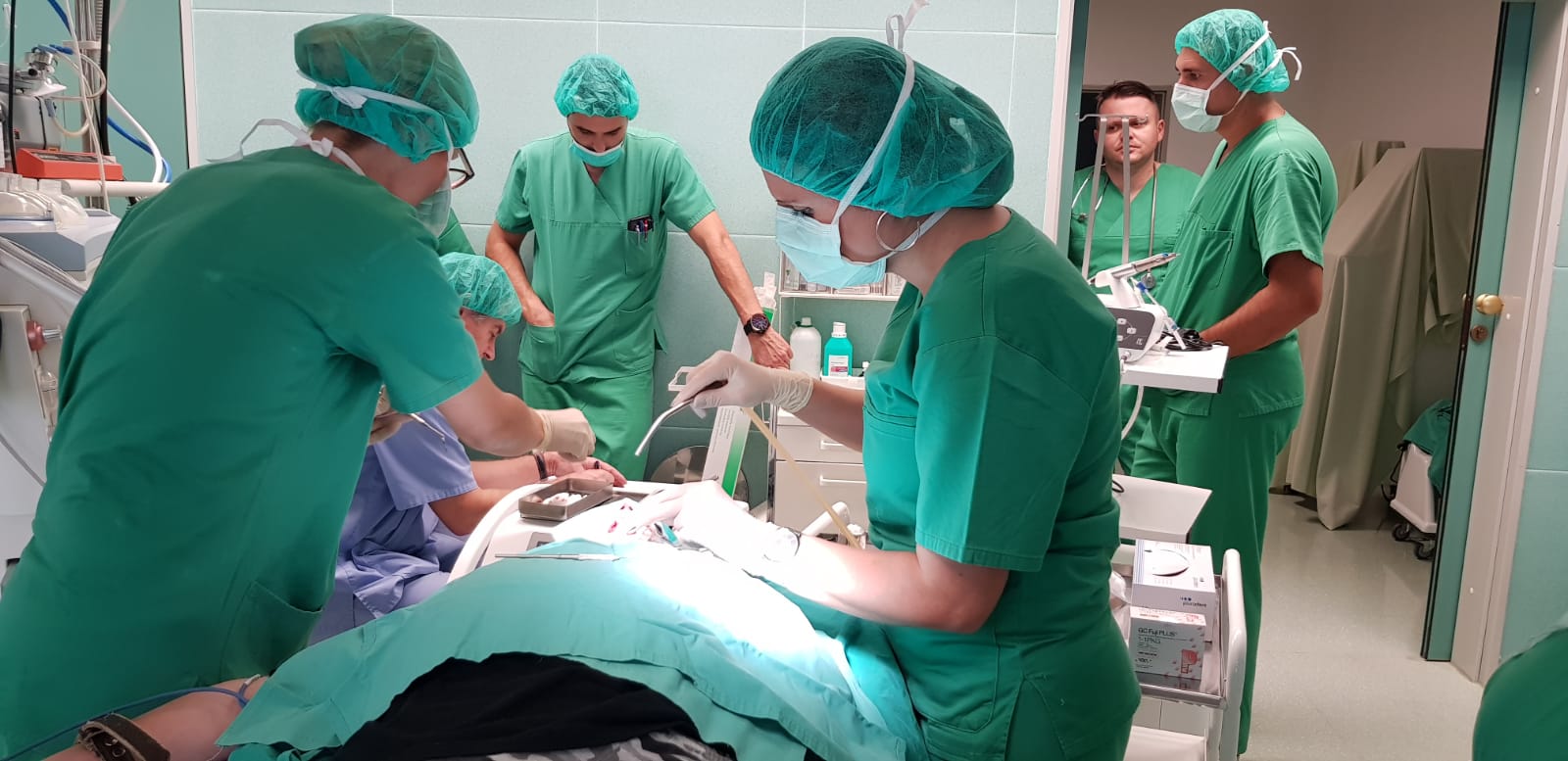
The team of Croatian hospital Dr. fra Mato Nikolić doctors at work, supplying free dentistry for all special needs children
Dr. Matković needed the approval of the Ministry of Health and of Central Bosnia Canton and authorities at the Croatian hospital Dr fra Mato Nikolić, lead by director Dr. Velimir Valjan, in order to begin the programme. Both quickly agreed that it was needed and agreed to contribute funding to help establish it. The programme of free dentistry for all special needs children in the Central Bosnia Canton region started in late 2018. But, that was just the beginning.
“We soon started getting calls from parents of special needs children from outside the region,” remembers Dr Matković. “And from full-time carers of adults who also have special needs. We soon realised we could not just leave them with nowhere to turn. We again approached the authorities and asked for permission to widen the programme and they were incredibly supportive. We've so far had around 120 clients, between the ages of six and thirty-five. And they've travelled here for treatment from every corner of Bosnia.”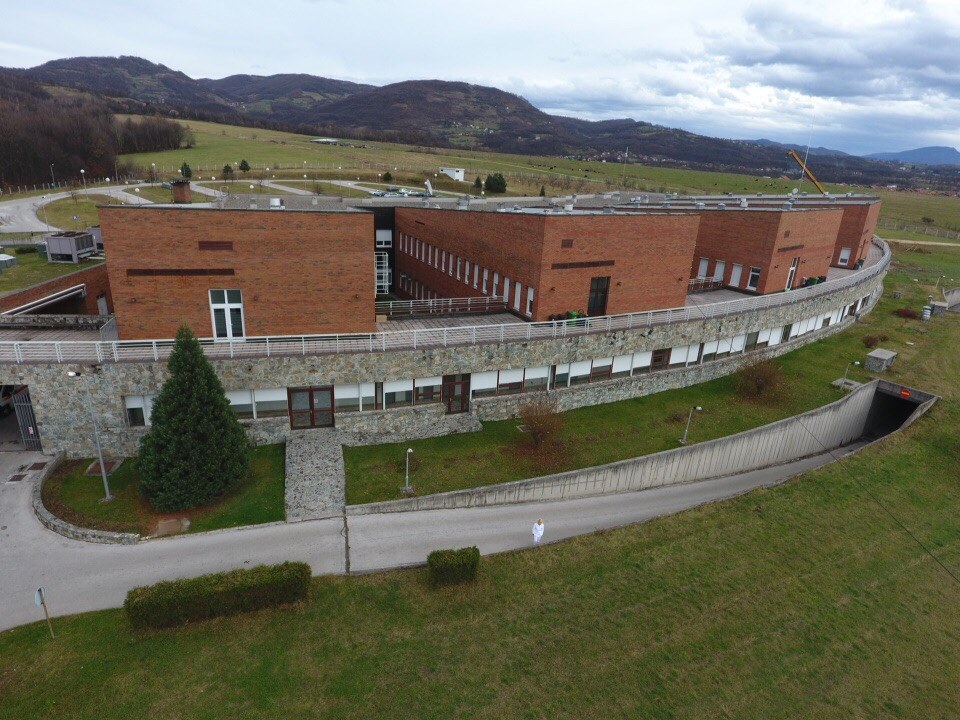
Croatian hospital Dr. fra Mato Nikolić. Welcoming all ethnicities and people of all religions, it gives free dentistry for all special needs children
For an outsider – such as this writer – if can be baffling to try and understand how Bosnia and Hercegovina works. The country is populated by the same people, although they've been separated for hundreds of years by three competing religions. This separation led to ethnic tensions rising during the break up of Yugoslavia, leading to Bosnia now being split up into several internal cantons under one federation, another autonomous state - Republika Srpska - plus the self-governing district of Brčko.
“This question may be stupid, but is healthcare the same in Bosnia as it is in Croatia?” asks this British member of the TCN team, rather naively. “Do you have the same option of health insurance to all the people who live there, no matter where they live? And, you're called Croatian hospital Dr fra Mato Nikolić. Does that mean that you treat only Croats? Do Muslims and Serbs have their own separate hospitals?”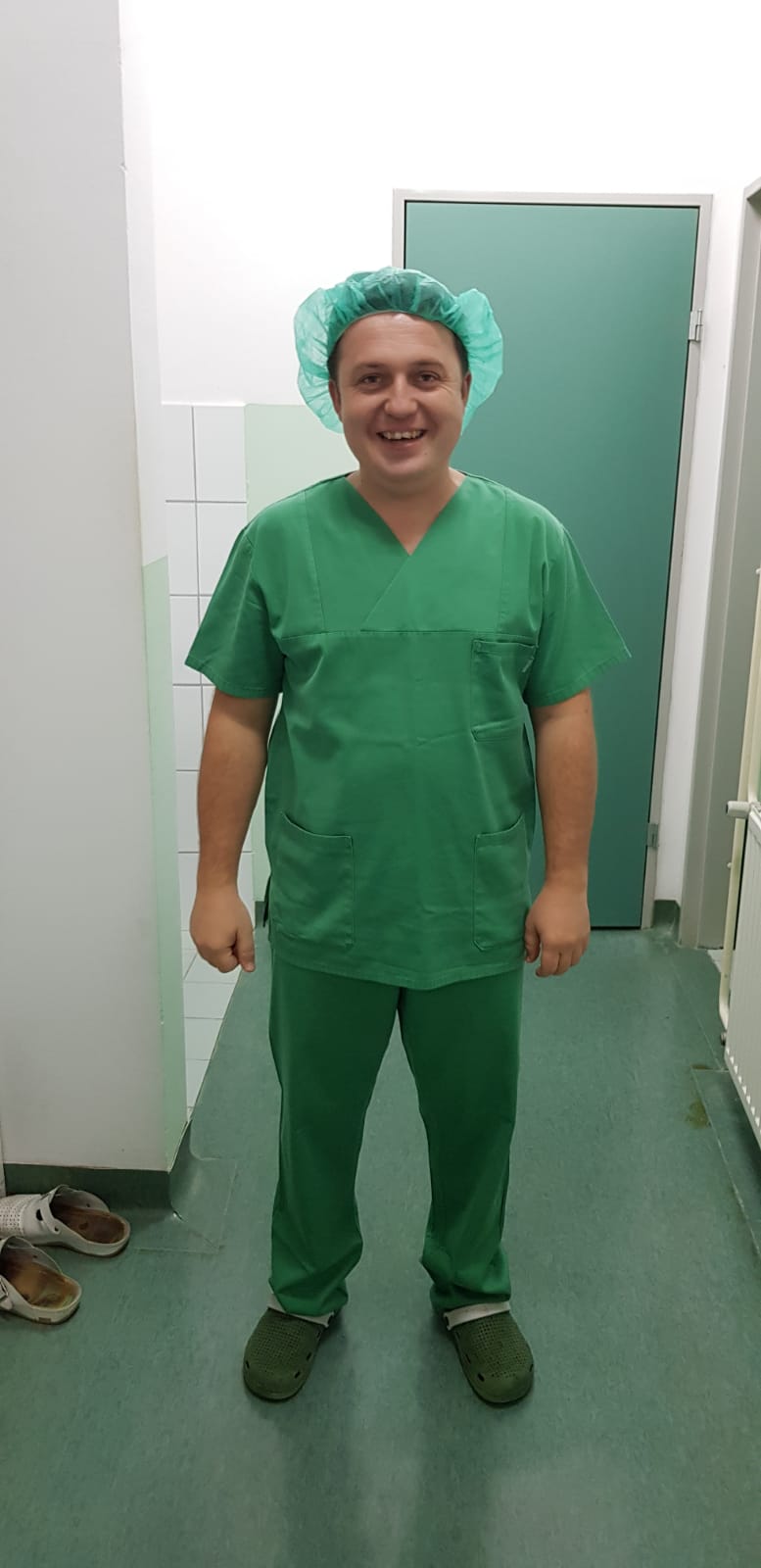
Dr Nikola Matković
“Ahahaha, it's not such a stupid question really,” laughs Dr Matković. “Bosnia can be a confusing place. Well, the answer to your first question is no. It's not the same as in Croatia, it's a lot more complicated because there's a completely separate system for those who live in Republika Srpska. But, I'm pleased to say that we have overcome all the bureaucracy and difficulties to be able to treat patients from every part of Bosnia, including Republika Srpska. The NGO Betanija who set the ball rolling is a multi-ethnic organisation. They welcome people of every ethnicity and religion. So do the Croatian hospital Dr fra Mato Nikolić and this programme within it. Our hospital is called Croatian hospital because it was set up with great financial assistance from the Croatian government.”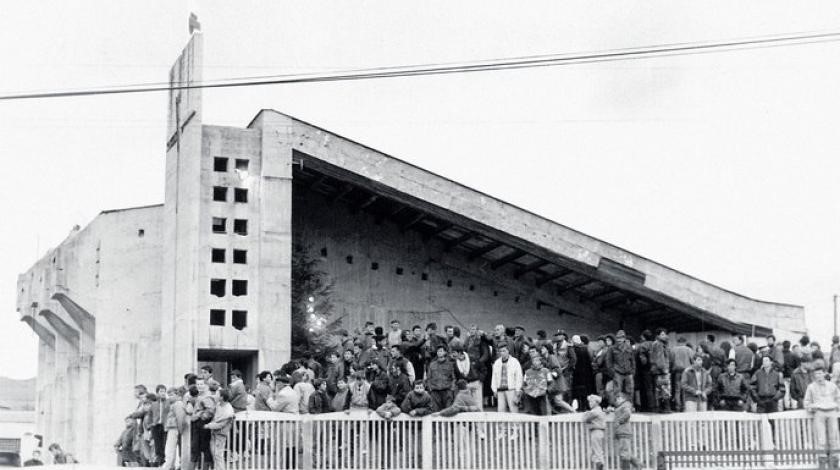
The parish church of the Holy Spirit in Nova Bila became the only medical resource for some 70, 000 trapped people during the war. Around half of them were refugees.
Croatian hospital Dr fra Mato Nikolić is named after a prominent Bosnian Franciscan, humanist and the first graduate doctor from Bosnia and Herzegovina - Fr. Mato Nikolić (1776-1844). It is a hospital known throughout Bosnia and Croatia because of the heroic work undertaken there by staff and volunteers during the time of war.
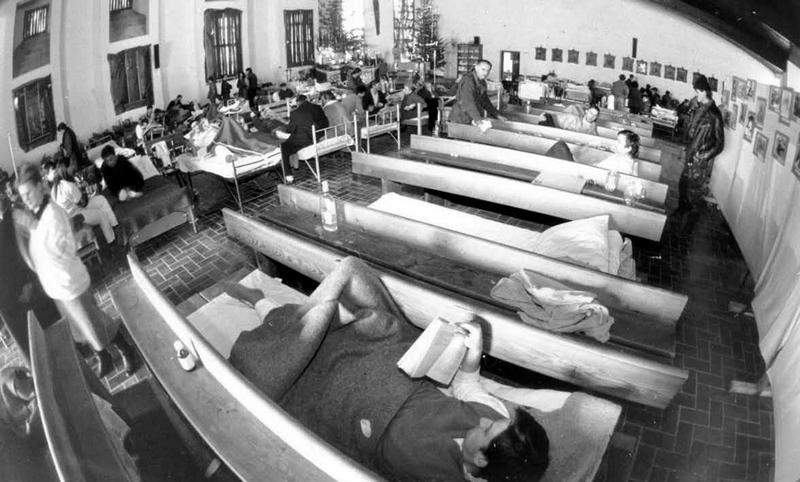
The church hospital in the time of war
In 1992, violent fighting caused a huge wave of forced migrations all across Bosnia. In the area where the hospital is now situated, the population almost doubled with the arrival of refugees. Some 70,000 people found themselves in an area 30 kilometers long and 2 kilometers wide. They were cut off from the rest of the world by the lines of fighting and by blockades. No hospital existed within the area, just the parish church of the Holy Spirit in Nova Bila. From there, a few healthcare professionals worked day and night, with almost no supplies, to treat the sick and wounded. So cut off was this group of people that they faced famine. The absence of any medical supplies was secondary to the very real threat of starvation.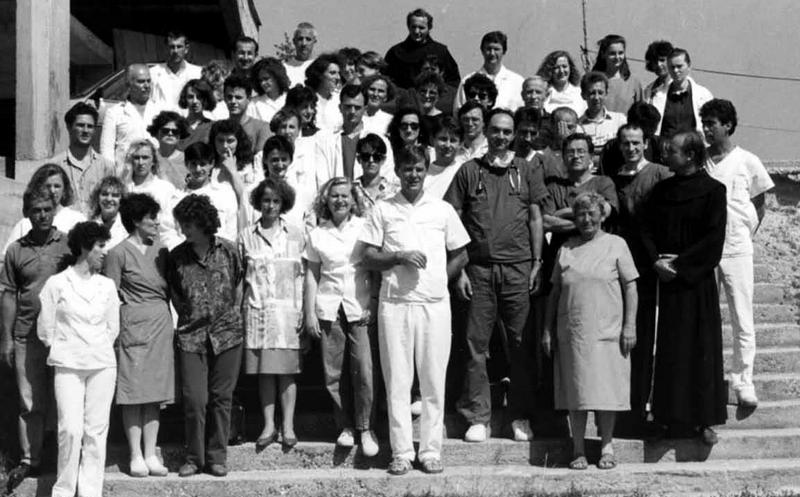
Staff of the war hospital Fr. Mato Nikolić pictured in 1993
War hospitals set up to try and deal with the trapped people proved ineffective, as the lines of fighting were constantly shifting. But, at the end of 1992, it was decided that the church in Nova Bila would be established as the main hospital for all those within the four municipalities of Travnik, Novi Travnik, Vitez and Busovača in the Lašva Valley. This war hospital took the name Fr. Mato Nikolić.
Despite having no regular supplies of electricity or even water, between 19 October 1992 to 1 April 1994, over 20, 000 people were treated and cared for in the hospital. 1,260 operations were performed under general anesthesia, 4,200 under local anesthesia. 721 children were born.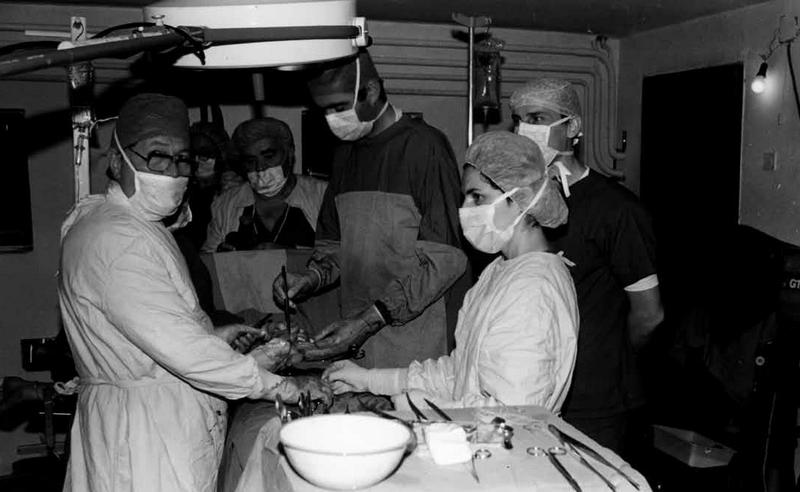
Despite having no regular supplies of electricity or even water, between October 1992 to April 1994, over 20, 000 people were treated and cared for in the hospital. 1,260 operations were performed under general anesthesia.
In June 1994, the President of the Republic of Croatia, Dr. Franjo Tuđman, visited the Lašva Valley and promised to build a new hospital. The new Croatian hospital Dr. fra Mato Nikolić was opened in 1999. Its pioneering programme to offer free dentistry for all special needs children from across Bosnia is just the latest commendable action undertaken by those associated with this hero hospital.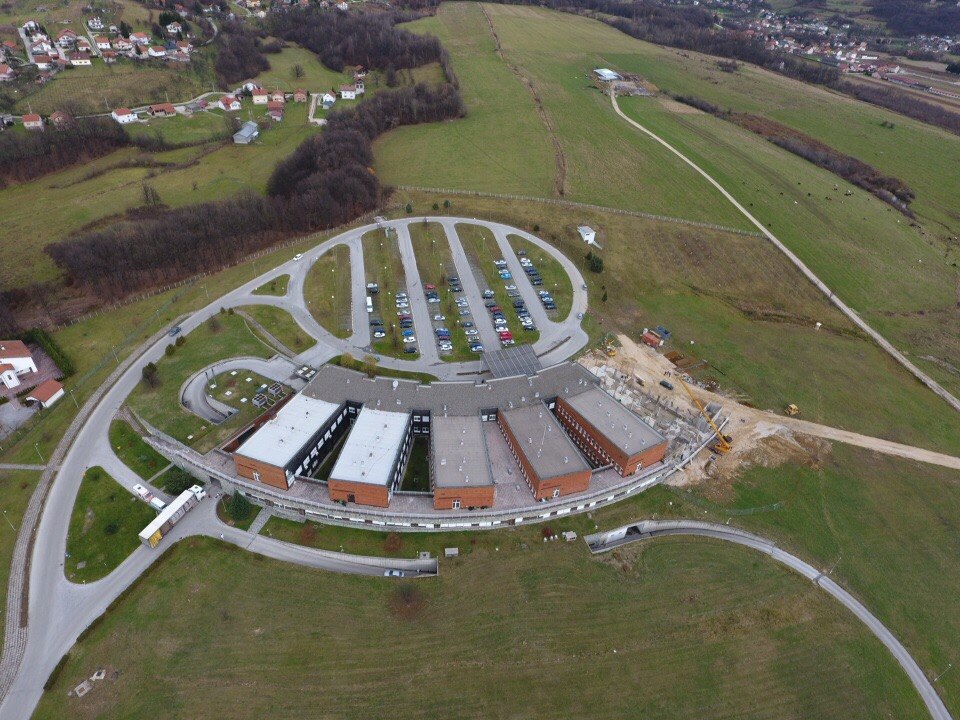
How the new Croatian hospital Dr. fra Mato Nikolić looked a few years ago, as its sixth wing was being constructed
All colour photographs © Croatian hospital Dr. fra Mato Nikolić, Dr Nikola Matković and municipality of Vitez
All black and white photographs © Bijeli Put documentary, original sources Davor Višnjić, Željko Maganjić, Srećko Stipović, Arhiv konvoja Bijeli put, Arhiv Kruh svetog Ante, Foto klub Split
For the latest travel info, bookmark our main travel info article, which is updated daily.
Read the Croatian Travel Update in your language - now available in 24 languages


